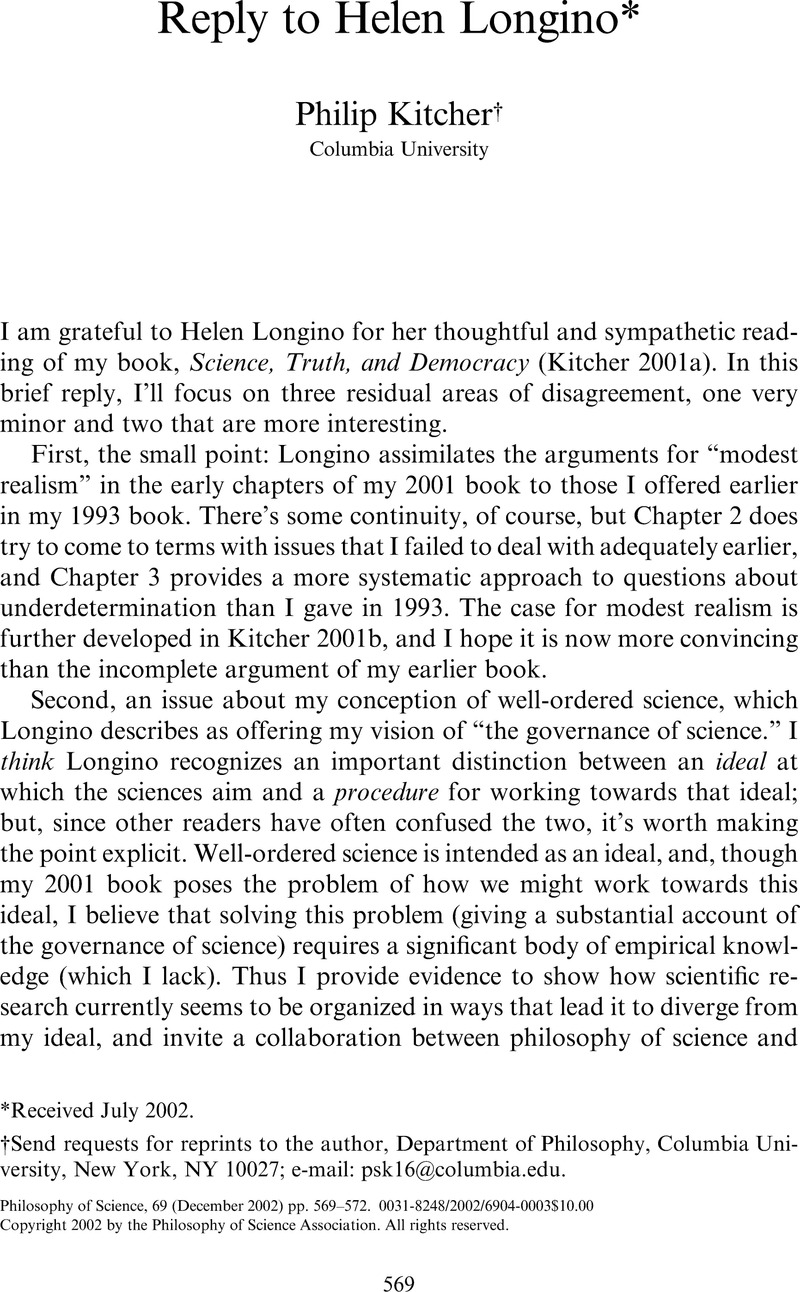Crossref Citations
This article has been cited by the following publications. This list is generated based on data provided by Crossref.
Mirowski, Philip
2004.
The scientific dimensions of social knowledge and their distant echoes in 20th-century American philosophy of science.
Studies in History and Philosophy of Science Part A,
Vol. 35,
Issue. 2,
p.
283.
Steel, Daniel
2004.
Can a reductionist be a pluralist?.
Biology and Philosophy,
Vol. 19,
Issue. 1,
p.
55.
Sorensen, Roy A.
2007.
Logically Equivalent—But Closer to the Truth.
The British Journal for the Philosophy of Science,
Vol. 58,
Issue. 2,
p.
287.
Biddle, Justin
2007.
Lessons from the Vioxx Debacle: What the Privatization of Science Can Teach Us About Social Epistemology.
Social Epistemology,
Vol. 21,
Issue. 1,
p.
21.
Freedman, Karyn L.
2009.
Diversity and the Fate of Objectivity.
Social Epistemology,
Vol. 23,
Issue. 1,
p.
45.
De Langhe, R.
and
Greiff, M.
2010.
Standards and the distribution of cognitive labour: A model of the dynamics of scientific activity.
Logic Journal of IGPL,
Vol. 18,
Issue. 2,
p.
278.
Richardson, Sarah S.
2010.
Feminist philosophy of science: history, contributions, and challenges.
Synthese,
Vol. 177,
Issue. 3,
p.
337.
Rickles, Dean
2011.
Philosophy of Medicine.
p.
523.
Alexander, Fran
2012.
Assessing information taxonomies using epistemology and the sociology of science.
Journal of Documentation,
Vol. 68,
Issue. 5,
p.
725.
Gómez, Amparo
2015.
New Perspectives on Technology, Values, and Ethics.
Vol. 315,
Issue. ,
p.
105.
Van Bouwel, Jeroen
2015.
Towards Democratic Models of Science: Exploring the Case of Scientific Pluralism.
Perspectives on Science,
Vol. 23,
Issue. 2,
p.
149.
Koskinen, Inkeri
and
Mäki, Uskali
2016.
Extra-academic transdisciplinarity and scientific pluralism: what might they learn from one another?.
European Journal for Philosophy of Science,
Vol. 6,
Issue. 3,
p.
419.
Benneworth, Paul
and
Olmos-Peñuela, Julia
2018.
Reflecting on the Tensions of Research Utilization: Understanding the Coupling of Academic and User Knowledge.
Science and Public Policy,
Philippi, Cristian Larroulet
2020.
Well-Ordered Science’s Basic Problem.
Philosophy of Science,
Vol. 87,
Issue. 2,
p.
365.
Lynch, William T.
2022.
Does Post-truth Expand or Restrict Political Choice? Politics, Planning, and Expertise in a Post-truth Environment.
Analyse & Kritik,
Vol. 44,
Issue. 1,
p.
137.
Starościc, Anna
2024.
Scientific progress as an ongoing problem. Philip Kitcher's stance.
Analiza i Egzystencja,
Vol. 66,
Issue. ,
p.
145.
Cornelissen, Joep P.
and
Werner, Mirjam
2025.
What Are Mechanisms? Ways of Conceptualizing and Studying Causal Mechanisms.
Organizational Research Methods,


